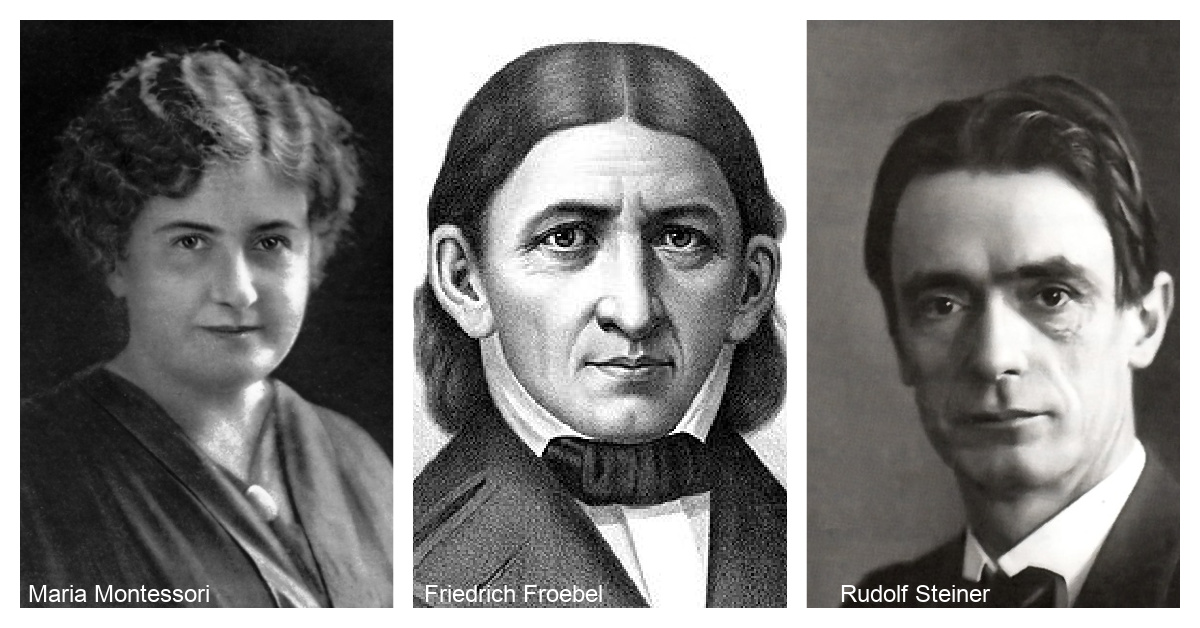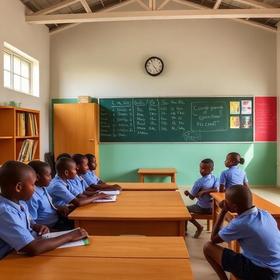Froebel, Montessori and Steiner: Champions of Children
Friedrich Froebel, Maria Montessori, and Rudolf Steiner were trailblazers in early education in the 19th and early part of the 20th centuries.
- Their ideas and philosophies shaped early childhood education as we know it in the 21st century.
- Who were these people?
- Why did they feel that early education was so important?

Freidrich Froebel
Freidrich Froebel (1782-1852) invented "kindergarten," which means "a child's garden."
- Froebel wanted children to interact with their surroundings. Interacting with nature was central to his philosophy of education.
- He believed that interacting with nature would lead children to a closer examination of how things work.
- Froebel was influenced by the Swiss pedagogue Johann Heinrich Pestalozzi (1746-1827), whose methods and approach to education, in turn, shaped a young Albert Einstein when he attended the local school in Aarau.
- Today, few people, except educators or trivia buffs, know who Froebel is, even though his influence in early childhood education was profound.
One feature of Froebel's approach to teaching children was the use of gifts.
- He developed five gifts to be given to the child in ascending order.
- The gifts were designed to teach awareness of shapes, spatial relationships, and many other concepts to even the youngest child.
This video offers an overview of Froebel.
Dr. Maria Montessori
Italian physician and pedagogue Dr. Maria Montessori (1870-1952) dared to take on the enormous challenge of educating poor, inner-city children in the slums of Rome, Italy.
- She was way ahead of her time in so many respects. She studied engineering and medicine at a time when women were supposed to be homemakers.
- Dr. Montessori did extensive research on how to teach children who had disabilities or who were mentally handicapped. Her Casa dei Bambini, or House of the Children, was started in a new housing complex in San Lorenzo, Rome, with mentally normal children as its students.
- Working with the children in her Casa dei Bambini allowed Dr. Montessori to apply the concepts that she had developed in her research and work with mentally handicapped children to the mentally normal children in her Casa dei Bambini. This is essentially how the Montessori method developed.
I had always assumed that Dr. Montessori taught the children by herself.
- Apparently, that was not the case in her first Casa dei Bambini.
- Dr. Montessori planned the children's lessons and set up the classroom.
- However, a young assistant taught under Dr. Montessori's supervision.
- Dr. Montessori generally confined herself to observing how the children learned, what activities interested them, and how they progressed over time.
Word of Dr. Montessori's work and her success with teaching children from economically disadvantaged circumstances spread.
- She held her first teacher training course in 1909 and wrote a book that codified her observations of the children in that first Casa dei Bambini.
- The book has a formidable title: Il Metodo della Pedagogia Scientifica Applicato All'Educazione Infantile Nelle Case Dei Bambini. In 1914 Il Metodo was translated into English, among other languages, and became a best seller in the United States.
Montessori schools spread around the globe. Montessori societies were established in many countries, including the United States.
- Indeed, Montessori schools are Dr. Montessori's lasting monument.
- Ironically, though, not every school that bears the Montessori name is the genuine article.
- Dr. Montessori never trademarked or otherwise protected her educational name and methods.
- As a result, a school that has Montessori in its name could be a school that adheres faithfully to the practices and teachings of Dr. Montessori, or it could be a school that has merely adopted some of those practices and approaches that appeal to the school's management. Buyer beware!
This video offers an overview of Maria Montessori and her educational philosophy.
Rudolf Steiner
Austrian philosopher and teacher Rudolf Steiner (1861-1925) was a humanist who created a philosophy named anthroposophy that very few people have even heard of. He was a prolific writer with over 300 books on various subjects.
- He influenced founding movements that promoted everything from biodynamic agriculture to persons with disabilities. In many ways, his most visible and lasting contribution was founding schools that bore his name.
- The first Steiner school was founded at the Waldorf-Astoria cigarette factory in Stuttgart, Germany 1922.
- There are now approximately 1,000 Waldorf schools worldwide.
This video describes Steiner or Waldorf education.
Educators with a common purpose
What did these educators have in common?
- They believed that children deserved to be children and should have fun learning.
- The Froebel gifts are all about childish fun and play.
- At the root of these wholesome activities is a basic child-rearing concept: encourage a child's creativity, stimulate his imagination, and allow him to explore.
Before Fisher-Price toys appeared on the market, Maria Montessori used natural wooden toys to teach shapes and geometric concepts.
- Steiner kept academics out of the early childhood education experience.
- He preferred to have children engage in activities appropriate to their tender years. Eurythmy allowed children to express themselves through dance and the performing arts.
In a time and society where many parents fret about the start their children receive as they begin school, it is important to realize that basics are important.
- Let your child progress at his own pace within a well-run primary school's warm, cheerful environment.
- Whether the school bases its approach on the teachings of Friedrich Froebel, Dr. Maria Montessori, or Rudolf Steiner isn't the point.
- What matters is that the school creates a safe, nurturing environment in which your child can explore the world around her and develop an awareness of how everything fits together.
- The hallmark of these three educators was their unanimous belief in allowing children to discover for themselves under the guidance of a caring teacher.
Conclusion
Prekindergarten and kindergarten build on those first years spent under your watchful, loving eye at home.
- They add socialization and enrichment to other children's interactions in a school setting.
- Just don't forget to do what Dr. Montessori did, namely, follow the child.
- The most important thing to watch for in any primary school is whether or not your child is happy.
- Sadly, early education has a few teachers whose rigidity and inflexibility can quickly create an unhappy child.
- You know your child. You know when she is happy.
- The right teacher and the right school will make for a happy child.
Questions? Contact us on Facebook, Instagram, and YouTube. @privateschoolreview
#EarlyChildhoodEducation #Froebel #Montessori #Steiner #Kindergarten #WaldorfEducation #ChildDevelopment #InnovativeTeaching













